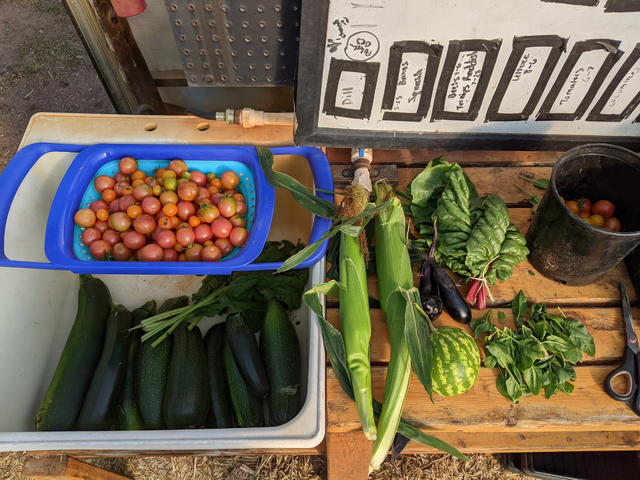On Tuesday, Sept. 22, the NMU Hoop House harvested an abundance of vegetables including collard greens, tomatoes and cucumbers that volunteers then helped wash and package to be sent to the NMU food pantry. Volunteers were also able to take home some of the fresh produce with them.
Being a part of the Hoop House is one of the ways students can access fresh, locally grown produce in Marquette, and the veggies are free if you donate some of your time to helping out.
“Local produce has a lot of benefits in itself,” said senior Maddy Humphrey, Hoop House Student Organization President and Environmental Science and Sustainability major. “They mostly are more nutrient dense and most of the time buying local is better for the environment as well. For student benefit, most of the time you can get seasonal veggies for cheaper and it improves the local economy.”
However, the NMU Hoop House is seasonal and will be closed down over the winter months. This doesn’t mean students don’t have options for cheap, easily accessible local food, even when the Hoop House isn’t operational.
Places like the Downtown Marquette Farmers Market provide local produce every Saturday in the Marquette Commons plaza. Local vendors there also sell hot coffee, kombucha, wool hats and handcrafted artwork and jewelry.
This outdoor market is open from mid-May until the end of October. Typically, November would mark the start of the indoor market but with COVID-19, the vendors are instead moving online, according to market manager, Sara Johnson.
“Because of COVID-19, we launched an online marketplace,” Johnson said. “It allows all of our vendors to list products for sale and then all of our customers can then basically shop online and then pickup their orders. It’s a congregation of all of our vendors in one place and you, as a customer, can make a single purchase that includes multiple vendors.”
This system allows customers to shop from local vendors and pick them up every Saturday through the month of December. This online marketplace option will become fully active at the close of the outdoor market and at that point, the market will make the switch to online orders only.
“It is pre-order and pick-up only; there are no vendors that are actively selling at the pick-up site,” Johnson said. “You’ll just get a bag with all of your products in it and you can take it and go home.”
This system will only be open through the months of November and December. If students are looking for more year-round access to local products, the Marquette Food Co-op at 502 Washington is a business that has been working with local farmers for years, according to Sarah Monte, the Co-Op’s outreach director.
As the seasons change so does the available produce, but no matter the weather outside, all locally grown produce is labeled with the community and farm it came from in the U.P.
“It is still the U.P. and we want to push local as much as possible but there are going to be limitations,” Monte said. “We’re starting to see some of the winter crops come up like the squash and we’ve been getting beets and carrots and things and those are going to continue for a while. As we get deeper into winter, you’re gonna start to see the tomatoes start disappearing, you can’t really help that with the climate, but potatoes, squash, beets, carrots, apples and those kinds of storage crops like onions and garlic.”
The changing of crop availability is one of the challenges of eating locally, Monte said. Certain crops are harvested during a window of time and then are no longer available as the weather gets colder or warmer.
“You’re going to have to adjust your cooking if you’re really gonna try to eat local or you need to put food away,” Monte said.
Putting food away can mean freezing or canning your local produce, but this isn’t always an option for students living in dorms or without adequate storage space.
While the Marquette Food Co-op also sells locally produced products like UP-made jams, honey, maple syrup and flour that are more easily stored and sold year round, they also offer cooking classes and recipes that use the local produce available in creative ways.
“This is our first-ever all-virtual year and the Marquette Food Co-op page has a calendar that lists all our classes,” Monte said. “In January we’ll definitely have a lot more classes.”
The online lessons teach everything from how to make latkes to samosas to how different herbs in your pantry can be used to treat ailments. The classes range from $5 to $15 in cost and the videos are recorded and can be rewatched. All classes can be found on the Marquette Food Co-op website and more classes will be added as the year progresses.
Another store selling primarily locally sourced produce is the recently opened Lakeshore Depot. Located on 560 Fern, it was founded by owner Mike Hainstock, who started the business this past July.
Even with the opening of Lakeshore Depot occurring in the midst of the COVID-19 pandemic, Hainstock has been able to offer customers a variety of local products from tomatoes and leafy greens to mushrooms and chicken eggs. They have also partnered with Superior Culture to provide local kombucha on tap.
“We’re trying to source as locally as possible, work with our small, local, independent producers and use products from downstate and throughout the region to fill in the gaps in our seasonal production up here,” Hainstock said.
The store is a mix between a traditional grocery store and a farmers market, according to Hainstock. He’s hoping to extend his availability of local produce and products by preserving local produce that is only fresh for a short period of time.
“Moving into next year, one of the things I’m really looking into and I’m wanting to work with a few people locally is having a large, sort of institutional scale, commercial kitchen that is able to take seasonally abundant local produce and process it into either frozen or canned goods,” Hainstock said. “That is a way that we could extend and increase our winter produce availability.”
Even with all these locations to access locally sourced produce and products, it is still sometimes a challenge for students to actively shop locally.
“Because we do live in the U.P. we do have a lot of good growers up here and farmers that have accessible produce like at the farmers market but it still is harder [to eat locally],” Humphrey said. “Most of the time it’s cheaper, but sometimes it’s not so I think sometimes students find it easier to go to the local Walmart instead of making the extra effort to get local produce.”
Making that extra effort is usually worth it though, according to Johnson. Not only is it better for the environment to move the produce short distances, but the food is fresher and the money spent at local vendors supports the community. Plus, it’s normally cheaper.
“Another thing to keep in mind, especially with students, is … Prices at a farmers market are significantly more affordable compared to a conventional grocery store and again, that’s because you’re cutting out the middleman,” Johnson said. “You’re buying directly from the producers themselves.”
Even if it does feel more expensive to buy local goods and fresh produce, most places, including the Marquette Food Co-op and Marquette Farmers Market, accept EBT and Supplemental Nutrition Assistance Program benefits.
“[Buying local] is really better all around for all players,” Humphrey said. “Including students.”


























